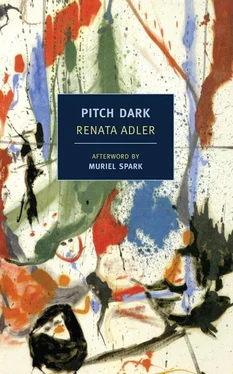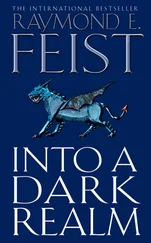Renata Adler - Pitch Dark
Здесь есть возможность читать онлайн «Renata Adler - Pitch Dark» весь текст электронной книги совершенно бесплатно (целиком полную версию без сокращений). В некоторых случаях можно слушать аудио, скачать через торрент в формате fb2 и присутствует краткое содержание. Год выпуска: 2013, Издательство: NYRB Classics, Жанр: Современная проза, на английском языке. Описание произведения, (предисловие) а так же отзывы посетителей доступны на портале библиотеки ЛибКат.
- Название:Pitch Dark
- Автор:
- Издательство:NYRB Classics
- Жанр:
- Год:2013
- ISBN:нет данных
- Рейтинг книги:3 / 5. Голосов: 1
-
Избранное:Добавить в избранное
- Отзывы:
-
Ваша оценка:
- 60
- 1
- 2
- 3
- 4
- 5
Pitch Dark: краткое содержание, описание и аннотация
Предлагаем к чтению аннотацию, описание, краткое содержание или предисловие (зависит от того, что написал сам автор книги «Pitch Dark»). Если вы не нашли необходимую информацию о книге — напишите в комментариях, мы постараемся отыскать её.
Pitch Dark Composed in the style of Renata Adler’s celebrated novel
and displaying her keen journalist’s eye and mastery of language, both simple and sublime,
is a bold and astonishing work of art.
Pitch Dark — читать онлайн бесплатно полную книгу (весь текст) целиком
Ниже представлен текст книги, разбитый по страницам. Система сохранения места последней прочитанной страницы, позволяет с удобством читать онлайн бесплатно книгу «Pitch Dark», без необходимости каждый раз заново искать на чём Вы остановились. Поставьте закладку, и сможете в любой момент перейти на страницу, на которой закончили чтение.
Интервал:
Закладка:
Conscious, as the youngest child at table, of needing to justify any claim upon attention by making a point quickly; conscious, in the offices of seriously busy men, great doctors, the highly competent or seriously rich, the powerful, of needing to keep the visit short; aware of the limited patience of his older brothers, reticent himself and quickly bored; he became a stellar lawyer in his later years. In the law, as in everything, excellence is rare and often anonymous. And, in the law, as in almost everything, everything is stories. Under the American Constitution, in fact, everything is required to be, at heart, a story. That is the meaning of the phrase “cases and controversies,” which is what, alone, the Constitution empowers the courts to consider. The courts may not, that is, consider abstractions, generalizations, even hypothetical cases; they may not render what are called “advisory opinions” as to the legality of any possible situation or contemplated act. The courts may only consider concrete, instant cases that actually, concretely come before them — and even those cases can be brought only by those who have “standing” to bring them, in other words, by the actual participants, with the most vital and demonstrable interest in the case. I may not bring suit, in short, because I think someone has done some injury to my neighbor. Only my neighbor himself can bring that suit. So what comes before the court is of necessity, and constitutionally obliged to be, a story; and the only ones permitted to bring the story to the courts’ attention, the only storytellers, are the ones to whom the story happened, whom the facts befell.
I said, Can we live this way. You said, Is it too hard for you this way. Kate, I’ll change things, if that’s what you want.
A case nominally begins with an injury, for which there exists in the law a kind of remedy, usually financial, but sometimes having to do, rather more brutally, with divorce, separation, incarceration, custody. At other times, more nobly, with rights, to speak, to learn, not to be stigmatized by race, to have one’s privacy left, by the state and neighbors both, alone. But even injuries, stories, of the clearest injury by one soul against another cannot, for the most part, appear before the law. Unkindnesses, betrayals, miseries of every sort fall into what may be, we cannot know, one of the most touching categories in, or rather quite outside, judicial contemplation. Failure to state a claim upon which relief can be granted. But if the claim, or rather the complaint as it then technically becomes, can be stated in such a way that courts are empowered to take it up, why, then, there is, immediately, or as the law would have it, in a reasonable time, the answer. The person, or persons, or entity against whom suit is brought, that is, must make an answer or concede the case, and lose it by default. With that, complaint and answer, the story, in at least two voices, irreversibly begins. Sometimes as in what are called class actions, there are transparently many, many voices — one class of persons suing on its own behalf and on behalf of the larger class, which includes, however anonymously, what are called all other persons similarly situated. Sometimes, more rarely, most of the story of which the case consists is something to be warded off, in that special kind of suit for equitable remedies called injunctions. To enjoin my neighbor, though, from doing something which the law does not explicitly prohibit, and even from doing things which the law firmly does prohibit, I must prove that not so to enjoin him would result in my sustaining what is called immediate and irreparable injury. But though you may do me just such an immediate and irreparable injury, for instance, by leaving me, or do your child just such an injury by turning the lights off when he fears the dark, the courts will not, in fact are not permitted to, take notice of the matter. And even if I know to a virtual certainty that someone is about to commit what is, quite technically and literally, an illegal act, even a crime, I cannot normally persuade the courts to let me argue that he should be enjoined from going through with it. “A man must act somehow,” Justice Holmes, quite often though by no means always cruel in his decisions, said; and our system favors leaving people free to act. If they choose to act illegally, they simply face the consequences of having done so. So, in one sense, every law is simply a codified injunction to prevent everyone from doing the illegal thing; while what are called injunctions are more rare, more narrow, more particular: this neighbor shall not build this dam this high lest his neighbor suffer the immediate and irreparable harm of being drowned. And in that same, broader sense every case or controversy, no matter how immediate and personal it may be, is a class action. Because every subsequent case that is in every key respect similar to it must be decided in the same way, and is therefore decided by it.
I said, I thought you wanted me to go. He said, No, you didn’t, you couldn’t have thought that.
And here, in a most extraordinary way, the stories told by lawyers, in other words before the courts, differ absolutely, almost perfectly, from the stories told by writers. Because in the telling and the resolution of stories in the law, lawyers and courts alike devote the most remarkable effort to saying, in effect, that the story before them is not new. “It is well settled” or “It has long been decided” is the court’s way of trying to conceal that what it is about to say is, in fact, entirely new; otherwise there would not be this specific plaintiff, this specific defendant, these specific witnesses, this set of facts before it. “We have always said,” the Supreme Court says again and again, introducing the most radical innovation or regression. With precedents. How heavily and necessarily the courts must rely on what can never be quite perfect precedents. It is as though a storyteller were to say, Listen, please, while I tell you just the story I told last night and the night before, and that differs in no way from the one told by others and before my time. Which is a fine and venerable tradition of storytelling. Except that the courts’ version of it has the most radical impulse imaginable on people’s lives.
About the story, she had said, It’s glum. Now he said, It is glum. But he said so many other things. I said, That’s a lovable man though, really. He said, No, it isn’t. Long ago he said, This is what matters; what you don’t realize is that all the rest is only motion. I said, Emotion? He said motion. There we were. Then, you said, in that voice, It’s a love letter in a way. I said, What else is it. So here we are.
But the essential storytellers at the drab, frightening, but sometimes heroic, poetic hearth that is the court are, not the lawyers or the judge at all, but the plaintiff, the defendant, and their witnesses. And these, these almost never understand what is being asked of them, what answers are permitted, what is the point of what is being asked. And nobody in this place, least of all that strange audience that is the jury, understands this incomprehension. Just when plaintiff, defendant, or witness thinks he or she has the hang of it, begins to reply, sometimes, triumphantly, sarcastically, in what he or she takes to be the lawyers’ language, there is objection after objection from interrupting lawyers, reprimands from judges. Why is it, the lady in the divorce proceeding wonders, that her husband’s lawyer can ask her, in scathing and insulting tones, And on the morning of July twelfth, did you not buy three shirts at Bloomingdale’s? On the same day, did you not also buy sheets at Bloomingdale’s? And is it not true that on that afternoon you also purchased stationery at Bloomingdale’s? And he can do this by the hour, and the judge, having said a few times, Counsel, I don’t want to tell you how to run your case but I think your point is established, now appears to be asleep. As does the other attorney for her husband, as do her own two attorneys, while this man drones on in this terrible insinuating way, about what she bought and charged and where, endlessly. She is permitted, it seems, to say only Yes or No. After a while, she thinks she has it. She says, Yes, counsel, as I think I have already indicated to you. She looks to the judge for approval. Nothing. It goes on. Suddenly, again, she thinks she has it. But these don’t show, she says, flushing, these lists of my charges don’t show the items I returned. But she really does think she’s got it, the point, the language, they are trying to put something over on her and she will not have it. But, your honor, I object! she says. These do not show which, if any, of these items I returned! Nothing. She doesn’t understand it, doesn’t understand that she doesn’t understand it. After a while, the judge stops reprimanding her, she thinks the story is now going her way, keeps saying her charge account bills don’t show what she returned.
Читать дальшеИнтервал:
Закладка:
Похожие книги на «Pitch Dark»
Представляем Вашему вниманию похожие книги на «Pitch Dark» списком для выбора. Мы отобрали схожую по названию и смыслу литературу в надежде предоставить читателям больше вариантов отыскать новые, интересные, ещё непрочитанные произведения.
Обсуждение, отзывы о книге «Pitch Dark» и просто собственные мнения читателей. Оставьте ваши комментарии, напишите, что Вы думаете о произведении, его смысле или главных героях. Укажите что конкретно понравилось, а что нет, и почему Вы так считаете.












